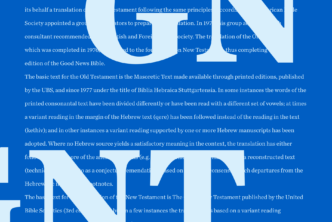Some say you must learn Greek and Hebrew before you can truly read the Bible as it was intended to be read. Others warn that a little knowledge can be dangerous…better to trust the opinions of others than dabble in the languages oneself.
Here at Logos, we’ve always been pretty open about our intentions to help regular, everyday Christians study the Bible at a deeper level. And that meansletting even “untrained” folksget their hands on Greek and Hebrew resources.
We’ve built tools like the Bible Word Study report, Exegetical Guide, and Reverse Interlinear Bibles that make Greek and Hebrew more accessible to the layperson. We include high-end, seminary level texts and tools in our most popular packages, which helps move such resources and knowledge beyond the seminary walls and directly into the pulpit and pew.
Are we guilty of helping spread to the masses those resources once reserved for the elite few?
Let’s just say Logos once had t-shirts printed up with the famous quote from Johannes Gutenberg, the inventor of movable type: “Religious truth is captive in a small number of little manuscripts which guard the common treasures, instead of expanding them.Let us break the seal which binds these holy things…”
In Defense of Dabbling
In the preface to the print edition of the ESV English-Greek Reverse Interlinear, editor John Schwandt includes an insightful discussion that covers the purpose and benefits of a reverse interlinear but also has a section entitled “Overcoming the Objection of the Dangers of Dabbling in Greek.”
John seriously and thoughtfully addresses the dangers of dabbling in the languages, particularly when it comes to wrong or ill considered motives such as an attempt to unlock the “true meaning of the text” that has been lost in English translations.
He also enumerates some of the very practical and real benefits to be gained by the student who is willing to work at learning the languages. Even dabblers canlearn to observe”structural patterns and word play,” and repetitions in tense, voice, or mood, he says.
John’s essay is well worth the read, and I hope it encourages you to ignore the cynics and go right on dabbling. Who knows, you might evenget a taste for Greek or Hebrew and go on to proficiency!
Related Links:





